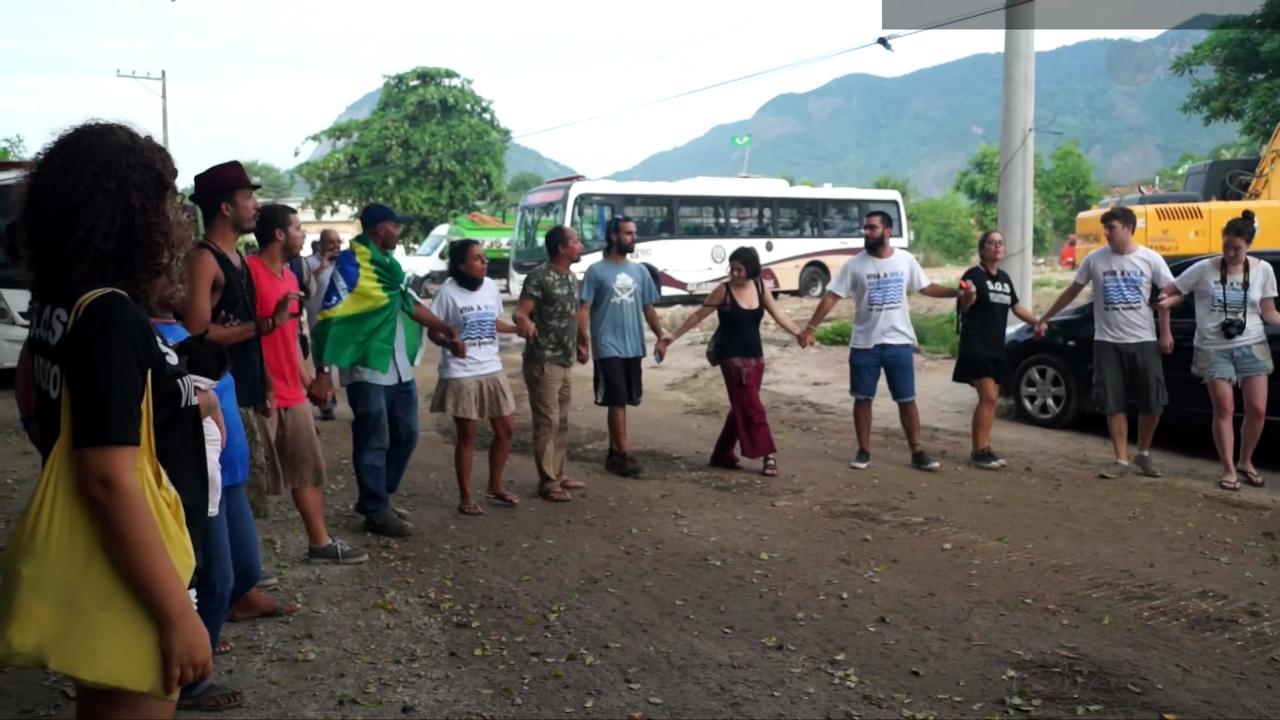Residents lose homes to make way for Rio Olympics – USA TODAY

How a Rio community was destroyed and displaced by Olympic development.
RIO DE JANEIRO – The video presentations used to pitch for hosting rights to an Olympic Games are glossy and sparkling and bursting at the seams with the same kind of narrative.
They focus on what an Olympics would add with its five-ringed slice of international obsession, all the gleaming parks and multi-purpose venues and that purport to provide years of benefit. The word legacy is used. A lot.
There is typically no mention of what the Olympics take away, and that is what most bothered Sandra Souza, as she gazed earlier this year from her balcony at the Vila Autodromo favela over a cluster of venues for this summer’s Rio Olympics.
“The Olympics should serve like an event to unite the people,” Souza told USA TODAY Sports through an interpreter. “But the reality, my understanding of the Olympic Games, I saw that wherever it goes, it takes it away.
“The Olympics does not allow poor people around it. That does not happen. Instead they leave us with this. Something that looks like a war zone.”
When the word favela is translated into English it typically becomes “slum,” or “shanty town.” It is slightly misleading. The Vila Autodromo was a safe, working class settlement originally populated by fisherman and then construction workers in the 1960s and ’70s. When USA TODAY Sports first visited in February the area had become primarily a building site, slowly being taken over by construction for the Games, including the adjoining Olympic park.
Souza, a resident of 20 years, remained in her home, a comfortable two-story dwelling that had a rough and rudimentary exterior but an inside that was well-maintained and was appointed with decorative care. She fought with many residents to keep away developers, an effort that was ultimately lost and displaced more than 600 families.
Rio’s powers that be decreed that despite its citizens holding a 99-year lease, Vila Autodromo had to be razed, making way for a complex filled with luxury apartments.
“The older constructions there do have some kind of a title deed,” Alexandro Rochedo, a Rio architect and businessman, said. “So the government finds itself in a complicated situation when they need to urbanize the area, because they need to remove (everyone). If it is a small community, they will be removed, but if it is big enough they will let them stay.”
Vila Autodromo might normally have been populated enough to resist the physical and political bulldozers. But its location was simply too lucrative to ignore.
Rio city officials did not respond to requests for comment.
In February, one property at Vila Autodromo that was originally part of a crude row of terraced homes stood alone, with the adjoining dwellings on either side having been bulldozed and only the walls left in place.
Pools of standing water infested with mosquitoes collected, a major concern with the Zika virus, primarily carried by mosquitoes, being among the many issues for these Olympics.
Police occupied the area with their van parked by a playground. “Protect us from what?” Souza said. “They are trying to intimidate us to leave.”
“Over several decades people had built up their homes,” said Teresa Williamson, executive director of the NGO Catalytic Communities, who has worked to help Vila Autodromo’s residents in the struggle. “Some of them were two or three stories, finished, painted and tiled. There were streetlights, a bakery, a supermarket, children played soccer, people set up outdoor hair salons. It was a very vibrant community.”
Williamson has long fought to protect favela communities from displacement, an uphill battle in this city.
“There are laws and regulations in place but getting them enforced against big business interests and the local government is very difficult for people with limited means,” Williamson added.
Souza and other residents, who ask not to be named for fear of antagonizing city officials, fondly remembered the site’s origins. In recent times, many of the occupants were descendants of those who settled when working at the nearby motorsport track in the late ’70s.
Souza stood on the balcony of her property, next to her teenage daughter, who was cradling a tiny dog named Onyx. The puppy was one of many left behind when residents departed and were no longer able to care for their pets.
Souza explained how the fight against eviction had long since become a point of principle. It was no longer pleasant to stay at the site, which had become dusty, dirty and filled with the noise of demolition.
“It is not nice here anymore but I want my daughter to understand that money cannot win everything,” she said. “I want her to know that having rights and protecting them is the most important thing.”
In February, Souza still dreamed that the battle would be won, that the developers would give up, and other exiles would return.
In the end though, the paperwork counted for little. Most residents felt they had little choice to accept the offer of alternate accommodation, across the city, and left.
Souza stayed true to her promise of resisting removal. She turned down work as an acupuncturist, fearing that her property, as was the case with others, could have been reduced to rubble unless someone was home at all times.
Eventually, in late May, the developers agreed to provide her and the handful of others who had remained new accommodation on the site, hidden from the view of the new apartments but connected by a road.
When USA TODAY Sports returned in June, Souza’s original dwelling was the last one standing, but was awaiting the bulldozer. Over the fence, the finishing touches were being put to the Riocentro Olympic development that will house boxing, badminton, gymnastics and athletes from several other sports. Souza reflected on a victory that didn’t feel much like one.
“What happened here was not right,” she said. “I get to stay but it is not the same place. It will not feel like home any more.”
Soon, tens of thousands of fans from around the world will walk through the Olympic facilities, unaware of what once sat over in the distance. In some ways the saga of Vila Autodromo was not about the Games, rather about real estate development and corporate greed.
But fair play and equality are still tenets of the Olympic ideal, at least we still prefer to believe so. At Vila Autodromo, on the doorstep of competition, they appear to have been in short supply.





















